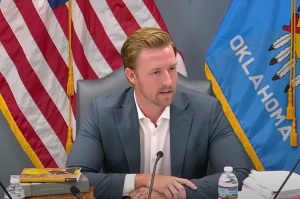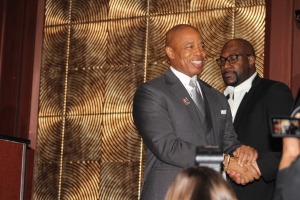Are 'Entitlements' an Oxymoron?
America is going bankrupt because our entitlements are out of control. As of this writing, the national debt has now surpassed the $16 trillion mark. As the President's own bipartisan Bowles and Simpson Commission of 2010 noted, "Our nation is on an unsustainable fiscal path."
Outlays in health care (Medicare and Medicaid) are the single largest expenses of our entitlement spending. Meanwhile, Bloomberg News reports, "A record 46.7 million Americans received food stamps in June" (9/4/12).
To entitle someone with something is "to furnish with a right," according to Webster's. An entitlement is something you're "entitled" to-it is owed to you. However, if I am owed "cradle to grave" assistance, e.g., money, education, healthcare, etc., then I surely don't owe gratitude to the government. It's my right, after all; and I'm entitled to it. But my question is: Says who?
"Oxymoron" comes from Latin-sharp and dull. It's a contradiction in terms in the same phrase, just like "jumbo shrimp." Who says we are entitled to the product of our neighbor's labor?
Certainly, many citizens have paid into Social Security and into Medicare and are relying on it. To cut them off is uncharitable and would result in suffering. That's not what we're addressing.
In a Wall Street Journal essay (8/31/12), about how entitlements are corrupting the "American Character," Nicholas Eberstadt writes: "In 2010 alone, government at all levels oversaw a transfer of over $2.2 trillion in money, goods and services."
Eberstadt points out that this is a bipartisan problem. He says of some Republican presidents: "the administrations of Richard Nixon, Gerald Ford and George W. Bush presided over especially lavish expansions of the American entitlement state."
About a year ago, I interviewed Steve Moore, Senior Economics writer of the Wall Street Journal. I asked him about the Christian justification that's often given for many entitlement programs, where people say, "How dare you take away these entitlements from the poor!"
Steve responded, "I always laugh and sometimes frown when people say the Christian thing to do is to continue to spend money recklessly like we are doing now."
He added, "If the government spends a dollar, that dollar has to come from somebody or somewhere….Isn't it Christian to care about your kids and your grand kids? The people who are going to bear the burden of our enormous overspending are our children, grandchildren, and grandchildren's children. I don't think it's Christian to pass on these enormous millstones of debt on to the necks of our children."
We've turned things upside down in this country, Moore noted. We're punishing the wrong people: "basically we're robbing the productive people of our economy today to give money to people who are unproductive. I don't think that's very Christian either. I mean, it's biblical that says, 'he who does not work, shall not eat.'"
He's referring to a statement from the Apostle Paul that is surely one of the most politically incorrect statements ever uttered: "If a man will not work than neither shall he eat."
The late Dr. D. James Kennedy once noted, "This verse does not refer to a person who is not able to work. The Scripture has a great deal to say about caring for the lame, the blind, the sick, the infirm, the aged, and the young. But if anyone will not work, then neither let that one eat."
Rather than being a cruel statement, this is a kind one, says Kennedy: "Were that not to a large degree followed, wholesale famine and starvation would plague the world."
It's one thing to have a social safety net. It's another thing when virtually half the country is in that safety net, when government-dependence is a way of life. The estimates are that 49 percent of Americans now receive substantial government assistance. Then, I guess the 51 percent of us who are working had better double up our efforts since the rest of the country is counting on us.
For millions, their prayer might be, "Our Father, which art in Washington, give us this day our daily bread." But unlike God, who can shower manna from heaven, when Washington does the showering, it comes from our neighbor's labor and his pocket.
Jesus loves the poor and wants us to do likewise. However, He is very clear that He has entrusted us all with different talents or gifts and abilities that He wants us to use. He commended the productive servant who converted 5 talents into 10 talents and the one who caused 2 to grow to 4. But who did Jesus rebuke harshly? The person who took his one talent and buried it.
Think of the tens of millions of human beings living off the government dole. Granted, some may be legitimately disabled and have no family or church family to help them. But many of them are going through life, for the most part, wasting the gifts God has given them. This is bad for us all in every way-financially, morally, spiritually, and psychologically.
I think "entitlements" are an oxymoron-i.e., that we are all due "cradle to grave" help from the government. No wonder secular humanists are for abortion. Rather than have more mouths to feed from infancy to old age, they want to prevent them from reaching that cradle. But what if the unborn baby was a potential contributor to society rather than a burden to be taken care of?
With entitlements comes a total lack of gratitude. Without gratitude to the ultimate Provider, we all become poor.





























